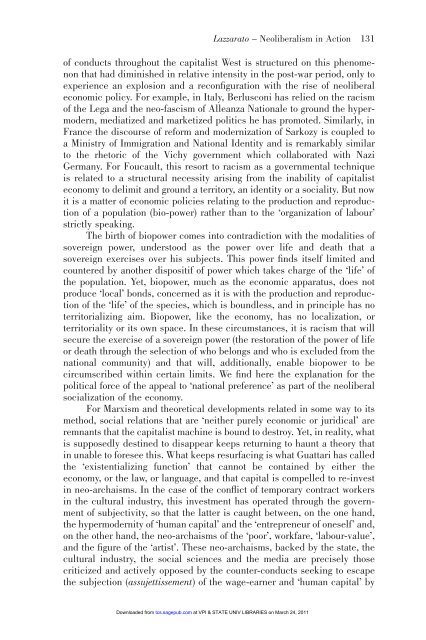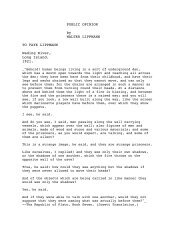Neoliberalism in Action Inequality, Insecurity and the Reconstitution ...
Neoliberalism in Action Inequality, Insecurity and the Reconstitution ...
Neoliberalism in Action Inequality, Insecurity and the Reconstitution ...
Create successful ePaper yourself
Turn your PDF publications into a flip-book with our unique Google optimized e-Paper software.
Lazzarato – <strong>Neoliberalism</strong> <strong>in</strong> <strong>Action</strong> 131<br />
of conducts throughout <strong>the</strong> capitalist West is structured on this phenomenon<br />
that had dim<strong>in</strong>ished <strong>in</strong> relative <strong>in</strong>tensity <strong>in</strong> <strong>the</strong> post-war period, only to<br />
experience an explosion <strong>and</strong> a reconfiguration with <strong>the</strong> rise of neoliberal<br />
economic policy. For example, <strong>in</strong> Italy, Berlusconi has relied on <strong>the</strong> racism<br />
of <strong>the</strong> Lega <strong>and</strong> <strong>the</strong> neo-fascism of Alleanza Nationale to ground <strong>the</strong> hypermodern,<br />
mediatized <strong>and</strong> marketized politics he has promoted. Similarly, <strong>in</strong><br />
France <strong>the</strong> discourse of reform <strong>and</strong> modernization of Sarkozy is coupled to<br />
a M<strong>in</strong>istry of Immigration <strong>and</strong> National Identity <strong>and</strong> is remarkably similar<br />
to <strong>the</strong> rhetoric of <strong>the</strong> Vichy government which collaborated with Nazi<br />
Germany. For Foucault, this resort to racism as a governmental technique<br />
is related to a structural necessity aris<strong>in</strong>g from <strong>the</strong> <strong>in</strong>ability of capitalist<br />
economy to delimit <strong>and</strong> ground a territory, an identity or a sociality. But now<br />
it is a matter of economic policies relat<strong>in</strong>g to <strong>the</strong> production <strong>and</strong> reproduction<br />
of a population (bio-power) ra<strong>the</strong>r than to <strong>the</strong> ‘organization of labour’<br />
strictly speak<strong>in</strong>g.<br />
The birth of biopower comes <strong>in</strong>to contradiction with <strong>the</strong> modalities of<br />
sovereign power, understood as <strong>the</strong> power over life <strong>and</strong> death that a<br />
sovereign exercises over his subjects. This power f<strong>in</strong>ds itself limited <strong>and</strong><br />
countered by ano<strong>the</strong>r dispositif of power which takes charge of <strong>the</strong> ‘life’ of<br />
<strong>the</strong> population. Yet, biopower, much as <strong>the</strong> economic apparatus, does not<br />
produce ‘local’ bonds, concerned as it is with <strong>the</strong> production <strong>and</strong> reproduction<br />
of <strong>the</strong> ‘life’ of <strong>the</strong> species, which is boundless, <strong>and</strong> <strong>in</strong> pr<strong>in</strong>ciple has no<br />
territorializ<strong>in</strong>g aim. Biopower, like <strong>the</strong> economy, has no localization, or<br />
territoriality or its own space. In <strong>the</strong>se circumstances, it is racism that will<br />
secure <strong>the</strong> exercise of a sovereign power (<strong>the</strong> restoration of <strong>the</strong> power of life<br />
or death through <strong>the</strong> selection of who belongs <strong>and</strong> who is excluded from <strong>the</strong><br />
national community) <strong>and</strong> that will, additionally, enable biopower to be<br />
circumscribed with<strong>in</strong> certa<strong>in</strong> limits. We f<strong>in</strong>d here <strong>the</strong> explanation for <strong>the</strong><br />
political force of <strong>the</strong> appeal to ‘national preference’ as part of <strong>the</strong> neoliberal<br />
socialization of <strong>the</strong> economy.<br />
For Marxism <strong>and</strong> <strong>the</strong>oretical developments related <strong>in</strong> some way to its<br />
method, social relations that are ‘nei<strong>the</strong>r purely economic or juridical’ are<br />
remnants that <strong>the</strong> capitalist mach<strong>in</strong>e is bound to destroy. Yet, <strong>in</strong> reality, what<br />
is supposedly dest<strong>in</strong>ed to disappear keeps return<strong>in</strong>g to haunt a <strong>the</strong>ory that<br />
<strong>in</strong> unable to foresee this. What keeps resurfac<strong>in</strong>g is what Guattari has called<br />
<strong>the</strong> ‘existentializ<strong>in</strong>g function’ that cannot be conta<strong>in</strong>ed by ei<strong>the</strong>r <strong>the</strong><br />
economy, or <strong>the</strong> law, or language, <strong>and</strong> that capital is compelled to re-<strong>in</strong>vest<br />
<strong>in</strong> neo-archaisms. In <strong>the</strong> case of <strong>the</strong> conflict of temporary contract workers<br />
<strong>in</strong> <strong>the</strong> cultural <strong>in</strong>dustry, this <strong>in</strong>vestment has operated through <strong>the</strong> government<br />
of subjectivity, so that <strong>the</strong> latter is caught between, on <strong>the</strong> one h<strong>and</strong>,<br />
<strong>the</strong> hypermodernity of ‘human capital’ <strong>and</strong> <strong>the</strong> ‘entrepreneur of oneself’ <strong>and</strong>,<br />
on <strong>the</strong> o<strong>the</strong>r h<strong>and</strong>, <strong>the</strong> neo-archaisms of <strong>the</strong> ‘poor’, workfare, ‘labour-value’,<br />
<strong>and</strong> <strong>the</strong> figure of <strong>the</strong> ‘artist’. These neo-archaisms, backed by <strong>the</strong> state, <strong>the</strong><br />
cultural <strong>in</strong>dustry, <strong>the</strong> social sciences <strong>and</strong> <strong>the</strong> media are precisely those<br />
criticized <strong>and</strong> actively opposed by <strong>the</strong> counter-conducts seek<strong>in</strong>g to escape<br />
<strong>the</strong> subjection (assujettissement) of <strong>the</strong> wage-earner <strong>and</strong> ‘human capital’ by<br />
Downloaded from<br />
tcs.sagepub.com at VPI & STATE UNIV LIBRARIES on March 24, 2011





